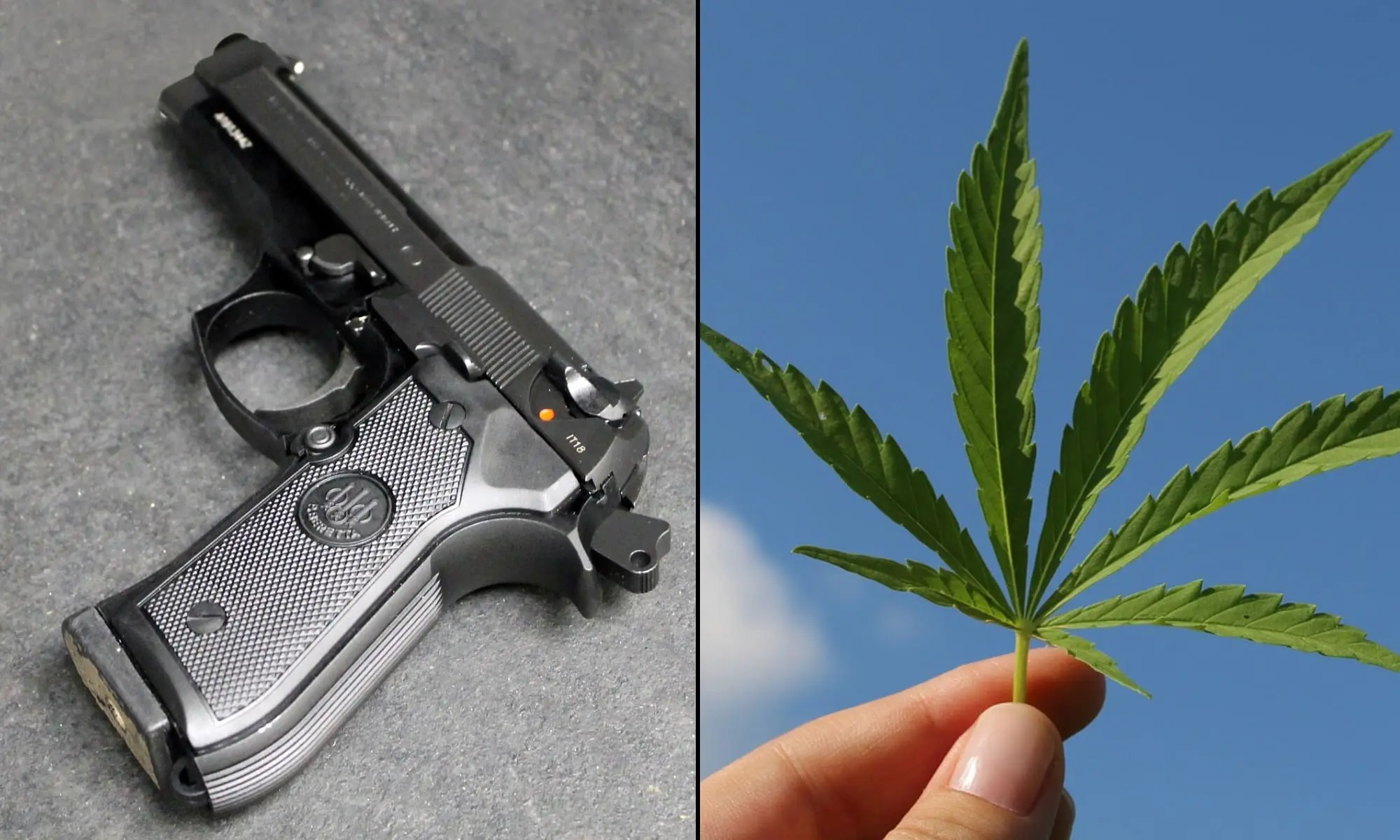Politics
Biden DOJ Says Medical Marijuana Patients Are Too ‘Dangerous To Trust’ In Motion To Dismiss Lawsuit On Gun Rights

The Department of Justice asked a federal court on Monday to dismiss a lawsuit that seeks to overturn a policy blocking medical marijuana patients from buying or owning guns. The filling is partly premised on the government’s position that it would be too “dangerous to trust regular marijuana users to exercise sound judgment” with firearms.
In making its case for dismissal, DOJ also drew eyebrow-raising historical parallels to past gun bans for groups like Native Americans, Catholics, panhandlers, those who refuse to take an oath of allegiance to the government and people who shoot firearms while drunk.
The lawsuit at hand, which was filed by Florida’s Democratic agriculture commissioner Nikki Fried and several medical cannabis consumers, asserts that the federal government is unlawfully depriving patients of their constitutional rights on multiple grounds, and the plaintiffs filed a revised complaint last month following a U.S. Supreme Court ruling on an unrelated gun rights case in New York.
As plaintiffs anticipated, DOJ submitted the motion to dismiss the case on Monday, the court-imposed deadline for a response. The government provided a justification for its dismissal request in an attached memorandum.
At a top level, the Justice Department said the gun rights are generally reserved for “law-abiding” people. Florida might have legalized medical cannabis, but the department said that doesn’t matter as long as it remains federally prohibited. It also said that, while two of the plaintiffs who were denied firearms after admitting on a federal form that they use medical marijuana might have standing for injury, it said neither the commissioner nor a separate defendant could say the same.
DOJ’s memo is also full of curious references to precedent and historic gun policies, in addition to dismissing the definition of medical marijuana altogether because the government upholds that cannabis “has no currently accepted medical use.”
“This memorandum uses the phrase ‘medical marijuana’ for convenience, but Congress has found that marijuana ‘has no currently accepted medical use.'”
While the department insists that federal law preempts state law, ignoring the numerous medical conditions that qualify for patients for cannabis in states like Florida, it also cites Florida’s law itself to justify the gun ban. It cites state policy requiring doctors to inform patients that medical marijuana use “impairs judgment, cognition, and physical coordination.”
Of course, so do many legal prescription drugs and alcohol, but DOJ zeroed in on Florida’s disclosure rule to support its argument that cannabis consumers with firearms pose a unique public safety danger.
The memo also pushes back against the implications of the recent Supreme Court ruling, which generally creates a higher standard for policies that seek to impose restrictions on gun rights. At a high level, the ruling states that any such restrictions must be consistent with the historical context of the Second Amendment’s original 1791 ratification.
The Justice Department memo lists what it believes to be adequate “analogous” examples of gun restrictions that give precedent to the current marijuana policy and its ongoing enforcement.
“Analogous statutes which purport to disarm persons considered a risk to society—whether felons or alcoholics—were known to the American legal tradition,” the memo argues.
Disarming unlawful drug users “is consistent with this Nation’s historical tradition of firearm regulation,” DOJ said. “Two related historical traditions are analogous: the tradition of excluding those who engage in criminal activity from the right to bear arms, and the tradition of disarming those whose status or behavior would make it dangerous for them to possess firearms.”
At one point, DOJ cited scholars who have said that, historically, “the right to bear arms was tied to the concept of a virtuous citizenry.” It’s not clear if the department is actually suggesting here that marijuana use makes a person unvirtuous—but it wouldn’t be the first time.
A “historical tradition exists of regulations that restrict or prohibit firearms possession by those whose possession of firearms the government deems dangerous,” the filing says, adding that “the impairing effects of illegal drugs, including marijuana, make it dangerous for regular unlawful drug users to possess firearms.”
Here are some other choice analogues DOJ offered in its memo for a motion to dismiss:
“In England and in America from the colonial era through the 19th century, governments regularly disarmed a variety of groups deemed dangerous. England disarmed Catholics in the 17th and 18th centuries…Many American colonies forbade providing Indians with firearms….During the American Revolution, several states passed laws providing for the confiscation of weapons owned by persons refusing to swear an oath of allegiance to the state or the United States…States also have disarmed the mentally ill and panhandlers.”
“Perhaps most relevant here, a long tradition exists of viewing intoxication as a condition that renders firearms possession dangerous, and accordingly restricting the firearms rights of those who become intoxicated. In 1655, Virginia prohibited ‘shoot[ing] any gunns at drinkeing…’In 1771, New York prohibited firing guns during the New Year’s holiday, a restriction that ‘was aimed at preventing the ‘great Damages … frequently done on [those days] by persons…being often intoxicated with Liquor.'”
“The historical tradition embodied by these laws continues today, with a majority of states ‘restrict[ing] the right of habitual drug abusers or alcoholics to possess or carry firearms,” DOJ said. It continues to say that cannabis “causes significant mental and physical impairments that make it dangerous for a person to possess firearm.”
While plaintiffs aren’t saying that medical marijuana patients should have the right to use a firearm while intoxicated from cannabis, DOJ said that there’s a “flaw” in that logic because “marijuana use impairs judgment—as Florida’s Board of Medicine puts it, ‘the ability to think, judge and reason.'”
“It is therefore dangerous to trust regular marijuana users to exercise sound judgment while intoxicated, a fact tragically borne out by the frequency with which marijuana users drive while impaired and suffer fatal collisions,” it said.
“Marijuana users with firearms pose a danger comparable to, if not greater than, other groups that have historically been disarmed. For example, ‘like the mentally ill,’ drug users ‘are more likely to have difficulty exercising self-control, making it dangerous for them to possess deadly firearms.’ In addition, the impairments caused by marijuana use are analogous to those caused by ‘intoxicat[ion]’ with alcohol, which has historically justified firearms restrictions. In fact, greater justification exists for firearms restrictions on marijuana users because, unlike alcohol, marijuana is an illegal drug. Such restrictions are therefore also analogous to firearms restrictions on those engaged in criminal activity.”
Fried, who is running in a Democratic gubernatorial primary for a chance to challenge incumbent Gov. Ron DeSantis (R) in November, told Marijuana Moment on Friday that she expected the department to request a motion to dismiss, but she’s confident they will ultimately prevail if the court allows the case to gets to the merits.
“I would imagine how this is going to eventually fold out, because of the new SCOTUS opinion from a couple weeks ago, I do believe the department is going to recognize that they’re going to have to make changes to this [Bureau of Alcohol, Tobacco, Firearms and Explosives] form,” she said, referencing the ATF background check form that asks about a person’s marijuana use.
“I would imagine that, along the way, they’re going to keep fighting it until they get told by a judge to do it,” Fried said. “But right now, we’re still monitoring it.”
The plaintiffs decided to file the amended lawsuit because of the recent SCOTUS ruling. They argued that, because marijuana prohibition was enacted more than a century years after the ratification of the Second Amendment—and the fact that cannabis was previously prescribed by doctors before the plant was criminalized—the existing ban should not hold up in court with the new precedent.
DOJ clearly spent time attempting to find holes in that argument after the department requested more time to respond in the case before the U.S. District Court for the Northern District of Florida. In doing so, however, the department highlighted historical precedent that show a pattern of instituting several controversial gun policies, like restricting firearm rights for Native Americans and people who wouldn’t pledge their patriotism.
Also notably, the department explicitly acknowledges that the U.S. attorney general “has authority to ‘transfer between schedules’ any drug or ‘remove any drug or other substance from the schedules’ if, after considering scientific and medical evaluations and recommendations from the Secretary of Health and Human Services, he finds that the drug meets criteria for a different schedule or does not meet the requirements for any schedule.”
“Since enactment of the CSA, however, the Executive Branch has denied various requests to reschedule marijuana, and marijuana has been and remains a Schedule I drug,” it said, highlighting the Biden administration’s refusal thus far to follow through on campaign pledges to change federal cannabis laws.
Fried previously told Marijuana Moment in an interview that the challenge is not about expanding gun rights, per se. It’s a matter of constitutionality that she and other key allies in the gun reform movement feel would bolster public safety if the case goes in their favor.
Specifically, because state-compliant medical cannabis patients are required to fill out an ATF form that asks about marijuana use (and answering in the affirmative would render them ineligible for a gun purchase), Fried says that creates an incentive to either lie, buy a gun on the illicit market or simply forgo a constitutional right.
In 2020, ATF issued an advisory specifically targeting Michigan that requires gun sellers to conduct federal background checks on all unlicensed gun buyers because it said the state’s cannabis laws had enabled “habitual marijuana users” and other disqualified individuals to obtain firearms illegally.
Fried brought the lawsuit alongside two medical marijuana patients in the state, as well as Neill Franklin, a retired police officer and former executive director of the Law Enforcement Action Partnership (LEAP) who has declined to use medical cannabis despite its therapeutic value for pain he experiences because of the potential gun rights ramifications.
Another component of the legal challenge is based on a unique interpretation of a congressional spending bill rider known as the Rohrabacher-Farr Amendment, which prevents the Justice Department from using federal funds to interfere in the implementation of state medical cannabis programs.
By preventing people like Franklin from using medical marijuana without risking the loss of their right to buy firearms, the federal government is effectively violating that rider by blocking Florida from adding new patients to grow its program, according to the suit.
DOJ said in its new memo that Franklin doesn’t have standing in the case because he hasn’t faced any specific injury. It also said that the protections of the Rohrabacher-Farr Amendment are limited, and it pointed out that it hasn’t spent dollars to interfere in the implementation of Florida’s medical cannabis program.
There have been previous efforts in Congress to specifically protect medical cannabis patients against losing their right to purchase and possess guns, but those efforts have not been enacted.
Read the Justice Department’s motion to dismiss and justification memo below:



